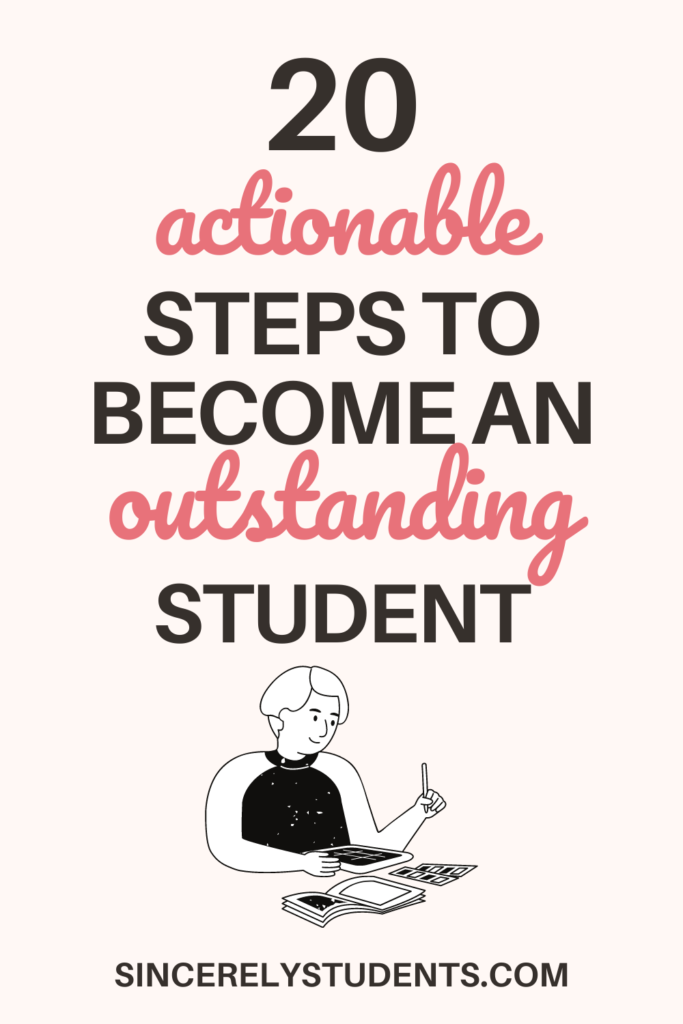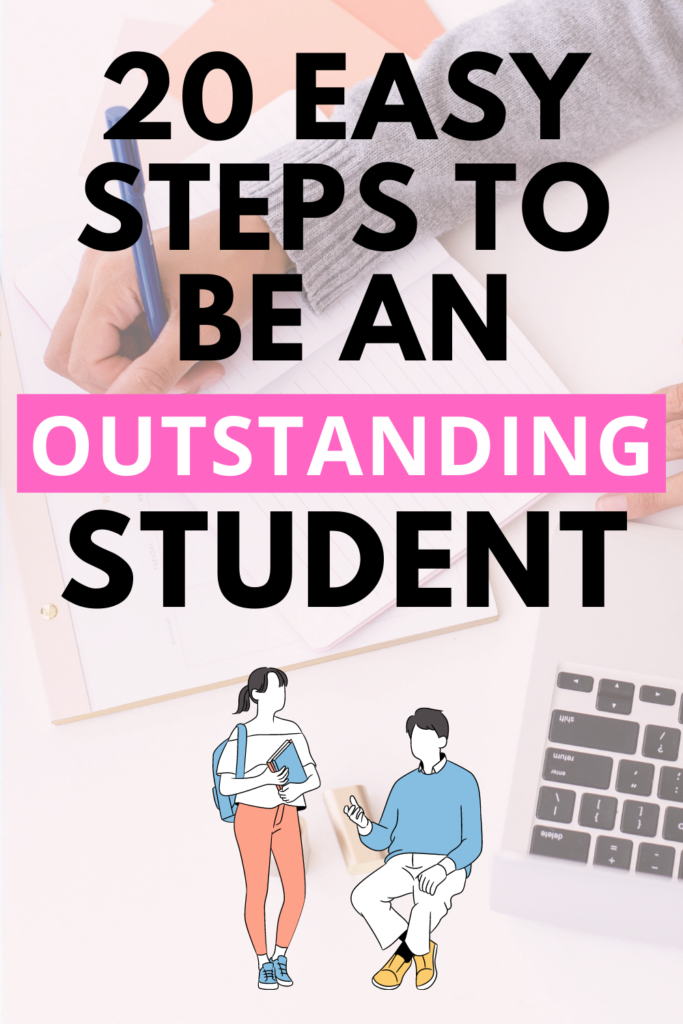Have you noticed how some students just seem to thrive in school? They’re productive, intelligent, well-rounded, and overall a great student!
It’s easy to believe that these students are just born smart. No matter what class they’re taking, how hard the course is, and how busy their personal lives are, they always get good grades.
Of course, your grades don’t define your success or failure. Grades are only a part of your education, and you should not let a few bad grades beat you down.
But it’s never bad to try to become a better student. And good students aren’t necessarily smarter than others; they’ve just developed better habits.
In this post, I’ll reveal the 20 most important – and highly actionable, meaning that you can start implementing them right now – steps to become a better student. Let’s get started!

Create schedules
Productivity is a common characteristic among good students. But there’s a right way to practice and build productivity, and it starts with making schedules.
Every day (and every week, if you have a clear idea of what your routines look like), time-block the following day and/or create a schedule, along with a to-do list.
You can do this on a planner or a digital calendar.
Plan and structure
Planning ahead ensures structure in your schedule, which means that you can’t wait until you feel like doing something to do it; instead, make plans and follow through.
Two tasks that go hand-in-hand are making to-do lists and timetables. If you use a planner (and I highly recommend you to use one), maximize its utility by writing daily to-do lists, weekly habit-trackers, goals, etc.
YOU’LL LOVE THIS POST: The Ultimate Student Guide To Effective Monthly Planning
Set goals
You should always be setting goals, whether they’re long-term or short-term goals. At the beginning of a new year, new semester, new quarter, or even a new month, list out some goals you want to reach.
Every week, you can set small goals (these can be progress tasks that bring you closer to reaching your long-term goal) and focus on achieving them.
Write things down
Productive people don’t keep everything in their heads. They always write things down, whether in a planner or a simple notepad.
If you suddenly remember something important (like an errand you forgot to run or an assignment you need to turn in), quickly jot it down. Keeping it in your mind may seem reliable at the moment, but it’s easier than it seems to forget.
Organize your study space
If you mainly study at your desk or another designated study space, you need to ensure that it is organized and helps you focus. This means removing all distractions, keeping useful tools near, and ensuring comfort.
If you’re not sure where to begin in organizing or setting up your study space, check out this super-detailed guide:
One thing at a time
Do not multitask, especially when you’re doing things to require a lot of attention. Many students tend to do multiple things at once, thinking that this makes them more productive. It doesn’t; it simply distracts you from both tasks.
Therefore, instead of multitasking, do one thing at a time. Time-blocking your day will help tremendously, as you will have a set time for each task already planned out.
Another alternative is to use the Pomodoro method, modified. Instead of taking a break after 25 minutes of work, take a break after completing 1 thing on your to-do list. I find that this modified technique maximizes my productivity the most.
Don’t procrastinate
Not procrastinating is easier said than done, but it’s a crucial step towards becoming a better student. By finishing your to-do list early and efficiently, you’ll have “extra” time to do other things!
Here are a few tips to help you stop procrastinating:
- Open your homework assignment and start working on it as soon as it is assigned.
- Remove all distractions, including your phone and social media (turn off notifications!).
- Set a schedule and implement a reward/punishment system to ensure that you follow it.
- Take breaks and stay healthy; get enough sleep and eat your meals.
- Check out the full post (and 8 helpful tips) on how to stop procrastinating here.
Track your progress
Tracking your progress can give you a sense of motivation and pride, which will help drive you towards becoming a better student. There are many different things you can track, such as:
- Your grades throughout the semester and year.
- The habits you’re trying to build or break.
- Level of mastery of a certain skill.
- How focused you are during the day.
- The amount of sleep you’re getting.
You can use a planner to track many of these (like with the Ultimate 3-in-1 Student Planner), or a mobile app such as Sleep Cycle or Forest.
Time yourself
Timing yourself is an extremely effective way to maximize productivity while working. And if you’re using an app like Forest, it will also remove the distraction of your phone!
You can use Forest or Flora (both of which time your study sessions while inhibiting the use of other apps), a Pomodoro timer, or even just a regular stopwatch or countdown.
When I’m not using an app, I use the Ikea Klockis, which is a smart clock with 4 different functions that switch just by turning the body of the clock: clock, temperature, alarm, and countdown.
YOU’LL LOVE THIS POST: 9 Essential Study Skills To Study Smarter, Not Harder
Pay attention in class
Productivity, though important, is not the only factor that makes someone a great student. Good students also have certain study habits that help them obtain, retain, and use information.
One of the most obvious ways to do this is to actually pay attention in class. Listen actively to what your professor is saying, look at their presentation or demonstrations, and run the information through your mind.
Take notes actively
Many students do take notes, but they don’t do so actively. Have you found yourself taking a whole 4 pages of notes, just to not actually know what you just read? If so, you haven’t been taking notes actively or effectively.
Instead of copying down every highlighted term and concept, think. Make connections, redefine the term, and make sure you understand it before you write it down. For more detailed steps, check out this post:
Review after class
Even after you’ve been attentive and active in class, you need to take 1 more step to ensure that the information stays in your brain: review.
After school, look over the presentation from class or the notes you took. Make sure you still understand everything (especially confusing concepts you may have highlighted during class) and add anything you feel may be necessary or helpful.
Talk to your teachers
Do not be afraid to talk to your teachers! Usually, teachers are happy to answer any questions or talk to their students, as they’d like to know how they can improve their teaching as well.
If you have any questions, don’t hesitate to ask your teacher. Just make sure it’s a genuine, thoughtful question and not one that you can find the answer to with a Google search.
Practice under pressure
If you have important exams coming up, and especially if it’s a standardized test like the SAT or the ACT, you need to simulate the testing experience by practicing under pressure, timed, and without outside resources.
Find a quiet environment where you won’t be distracted, and prepare to sit down and take a full practice test. Turn off your phone, time yourself (with a clock or stopwatch), and get working.
The more you practice, the less testing anxiety you’ll get, and the higher chance you will have to get a better score on your next test.
Learn from top students
Though you now know some top tips for being a better student, you may still not know where exactly to begin. In this case, find someone you look up to at school (someone you want to be like), and copy what they do.
Especially if you’re friends with a top student, you can start picking up their habits, such as:
- Going to the library on afternoons to do homework in a quiet environment.
- Eating healthy snacks and “brain food” instead of junk food.
- Staying after class to ask questions and clear up confusing points.
- Reading or doing homework while waiting for something/someone.
YOU’LL LOVE THIS POST: How To Motivate Yourself To Study When You Don’t Feel Like It
Work with friends
Your friends can be a source of motivation while you work. They can also stop you from becoming distracted, remind you of important tasks, and help you out on confusing questions.
Therefore, host group study sessions regularly! You can go to the library or a café together, bringing your homework and spend some study time together. Or, you could have a group call on FaceTime, Discord, or any other app and work together on the call.
Take breaks
As I’ve mentioned in previous posts, taking breaks is important. You must give yourself time to recharge and refuel before you can be at your maximum productivity and focus.
If you’re time-blocking or scheduling your day, make sure to leave short breaks between tasks and longer breaks every few hours. If you’re using the Pomodoro technique, simply follow the break times as it outlines.
Eat healthy meals
Staying healthy is one of the most important focuses for everyone; without a healthy body, you cannot do much else. In addition, eating healthily during the day will prevent unnecessary snacking while you work, which can subsequently make you more productive!
Get enough sleep
A common bad habit among teenagers and young adults is to follow a terrible sleep schedule. Sleeping too late and not getting enough sleep can have terrible effects on your health, productivity, and overall success in school.
Therefore, make active efforts to sleep earlier and for at least 8 hours. This can truly be difficult for some people, but for many others, it’s simply a matter of getting off TikTok.
If you think your phone addiction plays a part in your sleep schedule, check out this helpful post: How To Break Your Phone Addiction in 5 Simple Steps.
Give yourself pep talks
Last but not least, if you’re feeling demotivated or simply down in the dumps (which is completely normal!), give yourself a little pep talk.
No one is excited about studying 24/7, and maintaining motivation is a difficult task. But sometimes, a small pep talk is all you need to cheer up and calm down; think of your goals and action steps, as well as how far you’ve come already, and repeat some affirmations!
Conclusion
Congratulations, you made it to the end of this post! I hope you found these tips helpful and, more importantly, actionable!
Leave a comment below with what you’re going to try right now! And if you’re looking for more posts like this, check these out:
- How To Motivate Yourself To Study When You Don’t Feel Like It
- 7 Terrible Study Habits To Quit Immediately
- How To Effectively Prepare For An Online School Semester
